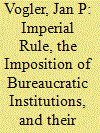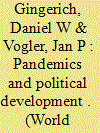| Srl | Item |
| 1 |
ID:
169493


|
|
|
|
|
| Summary/Abstract |
Significant variation in the institutions and efficiency of public bureaucracies across countries and regions are observed. These differences could be partially responsible for divergence in the effectiveness of policy implementation, corruption levels, and economic development. Do imperial legacies contribute to the observed variation in the organization of public administrations? Historical foreign rule and colonization have been shown to have lasting effects on legal systems, political institutions, and trade in former controlled territories. Imperial legacies could also explain variations in the performance of public administrations. The author uses the case of Poland to investigate the long-term effects of foreign rule on bureaucratic systems. Historically, Poland was split between three imperial powers with very different public administrations: Prussia, Austria, and Russia. Statistical analyses of original data collected through a survey of more than 650 Polish public administrations suggest that some present-day differences in the organization and efficiency of bureaucracies are due to imperial legacies.
|
|
|
|
|
|
|
|
|
|
|
|
|
|
|
|
| 2 |
ID:
179767


|
|
|
|
|
| Summary/Abstract |
Do pandemics have lasting consequences for political behavior? The authors address this question by examining the consequences of the deadliest pandemic of the last millennium: the Black Death (1347–1351). They claim that pandemics can influence politics in the long run if the loss of life is high enough to increase the price of labor relative to other factors of production. When this occurs, labor-repressive regimes, such as serfdom, become untenable, which ultimately leads to the development of proto-democratic institutions and associated political cultures that shape modalities of political engagement for generations. The authors test their theory by tracing the consequences of the Black Death in German-speaking Central Europe. They find that areas hit hardest by that pandemic were more likely to adopt inclusive political institutions and equitable land ownership patterns, to exhibit electoral behavior indicating independence from landed elite influence during the transition to mass politics, and to have significantly lower vote shares for Hitler’s National Socialist Party in the Weimar Republic’s fateful 1930 and July 1932 elections.
|
|
|
|
|
|
|
|
|
|
|
|
|
|
|
|